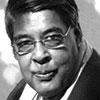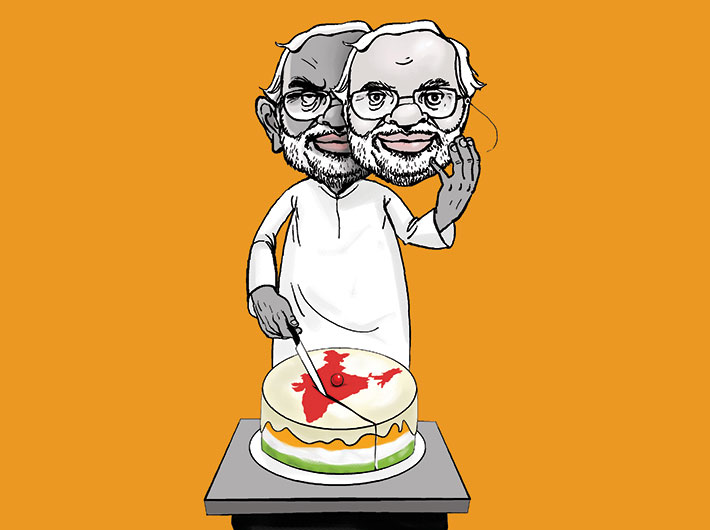PM wants to graduate to a statesman but his old, divisive self keeps coming in the way
All over the world, an element of theatre has always been a part of politics. In contemporary times, 24x7 media coverage has embellished the political theatre with touches of reality television. In our country, Narendra Modi has proved to be a master of using the changing media language to his advantage. He instinctively translates abstract political messages into palpable images, and thus touches the right chords with his audience.
He is well aware that even when he is speaking to the media after casting his vote, he is actually reaching out to millions of TV viewers – live. Bowing at the stairs of the central hall of parliament and breaking down in tears while describing the BJP as his mother – these images mesh perfectly with the messaging style he has consciously adopted over the years.
Let’s be clear: I don’t doubt the genuineness of his tears arising out of gratitude to his party and ideological fellow travellers. In fact, I appreciate the emphasis he placed on the political legacy of the RSS and the erstwhile Bhartiya Jan Sangh. Modi noted that the cherished dream of power has been realised due to the sacrifice put in by “five generations of dedicated workers and their families”.
At the same time, I do fervently hope that Modi’s tears also contained some feeling for those who lost their lives in Godhra, and in the events thereafter. This is not just a matter of rhetoric, considering that those recently acquitted by the supreme court in the Akshardham terror attack were reportedly asked by the Gujarat police to choose the crime for which they should be charged – Godhra, Akshardham or the assassination of former Gujarat home minister Haren Pandya!
Modi, while delivering his farewell speech in Gujarat assembly, rightly emphasised the importance of institutions for an authentic and robust democratic set-up. He mentioned the CAG in this context, but another important institution he neglected to mention is the election commission, which seemed to have been unduly attacked by Modi supporters during these elections.
During the 2002 post-riot assembly elections in Gujarat, Modi himself had undermined the office of the chief election commissioner by implying that the then CEC, JM Lyngdoh, was being guided by fellow Christian Sonia Gandhi. Respect for institutions is not a matter of one’s convenience. Rather, it indicates the degree of one’s genuine commitment to democracy. How would PM Modi asses the campaigner Modi and CM Modi on this count?
It is due to the heterogeneous nature of the Indian society and polity that Modi has had to ‘modify’ himself – he has tried to project the image of a magnanimous and farsighted leader; hence the welcome conciliatory tone of his post-election speeches.
But one needs to be clear whether his recognition of the achievements of all governments since independence, while speaking at the BJP parliamentary board meet, was a mere platitude or a sober assessment of history. If it was the latter, then will Modi express regret for having repeatedly dismissed, during the course of his campaign, the last 60 years under Congress rule as mere waste?
Similarly, how do the crude references to ‘chicken biryani’ by campaigner Modi conform with the invitation extended to Paskistan prime minister Nawaz Sharif by PM-elect Modi? How does the invitation to the PM of Bangladesh go with the talk of sending all ‘illegal’ Bangladeshis packing, and his words greeted with thunderous applause by crowds?
Many Modi supporters would like to make light of these instances by describing them as necessary election rhetoric, but they forget that rhetoric, besides catering to a certain mindset and audience, also creates its own autonomous force, which ends up demanding its pound of flesh.
Electioneering is bound to be loud and flashy but it cannot be allowed to run amok. One cannot casually dismiss the struggles of a nascent democracy and its considerable achievements through crowd-pleasing witticisms. There is a sea of difference between criticising the ruling party of the day and dismissing the whole of post-independence history as wasted time.
The media, in its Modi euphoria, has chosen to completely ignore the political import of the sarcasms directed at Modi by Shankarsinh Vaghela during the former’s farewell function organised in the Gujarat assembly. Vaghela was underlining the fissures in the Modi strategy of projecting development as the key issue while keeping his party’s hard-line Hindutva base intact. Vaghela’s sarcasms underline one set of challenges PM Modi has to face in balancing the demands of his core constituency with his ambition of becoming the mascot of the powerful middle class enamoured of commodity fetishism going by the name of development. This idea of ‘development’ was invented and sold by the Congress itself. The Congress gravy train was undone by the perception of all-pervasive corruption in the UPA-2 regime. Will the decisions taken by the supposedly corrupt regime be reversed? Will the coal block allocations be cancelled?
More importantly, will PM Modi, unlike CM Modi, be careful in choosing the targets, timings and tonalities of his attacks in future electioneering?
Here, one is unwillingly reminded of another leader convinced of being a man of destiny. Having conducted a vicious and violent hate campaign against a religious community, having realised his dream of a Muslim nation, Jinnah suddenly declared pious intentions of developing Pakistan as a secular state, into a home to all its inhabitants – Muslims and non-Muslims.
Jinnah – Qaid-e-Azam (the great leader) to his admirers – forgot that however ardently one might want to get rid of one’s past, it has a tendency of catching up. Deeds must match words, even those uttered in made-for-TV choked voices.
Closer in time, two and half decades ago, a now almost-forgotten but astute political observer named Rajendra Mathur, then editor of the Navbharat Times, had cautioned LK Advani – now estranged mentor of Modi – of the perils of riding the ‘tiger’ of communalism. In the wake of the first rath yatra undertaken by Advani, Mathur had written a signed front-page editorial telling Advani point blank: “You will not be able to control the forces you have unleashed.”
History proved Mathur right in less than two years.
One watches with interest mixed with a degree of anxiety, how history will now unfold for the nation under Prime Minister Modi.

